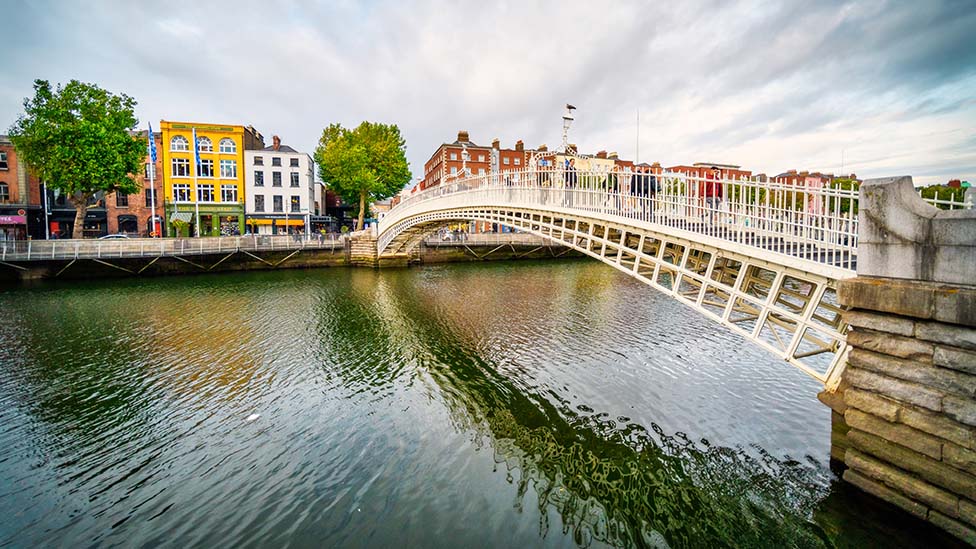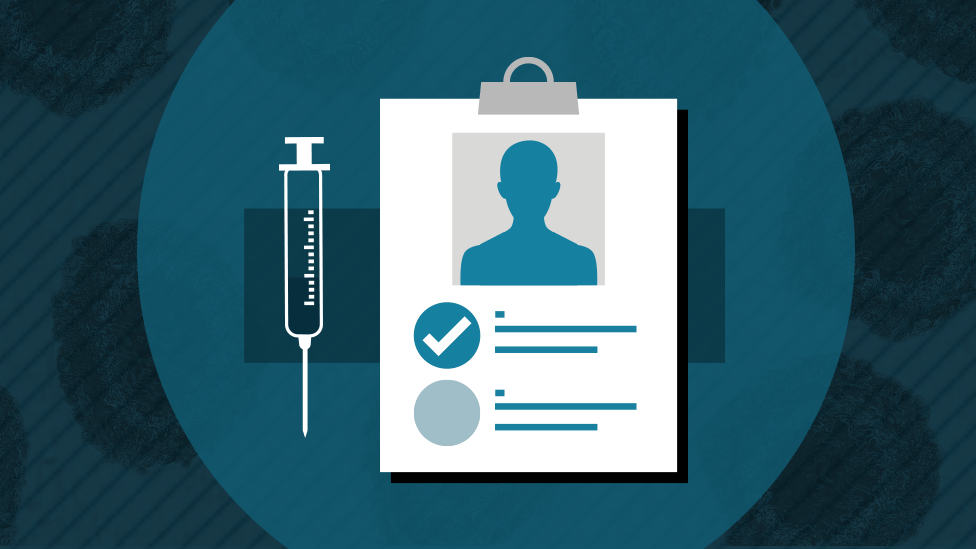What are the travel rules for France, the US, and other popular destinations?
- Published

Foreign travel is now easier for people in the UK than at any time since the beginning of the pandemic.
However, there are still regulations about who can enter most countries, restrictions on what you can do when you get there, and rules to follow when you return home.
These can change quickly, so it's important to keep checking the Foreign Office guidance, external and tourist information for your destination before you go.
Here are some key things to know about travelling to popular destinations.
Popular destinations
Spain
Travel guide
Skip Spain-
Entry requirements
Everyone travelling to Spain (including children) must submit an online Health Control Form (in English), no more than 48 hours before departure. This will generate a QR code which needs to be presented (either digitally or as a hard copy) at the Spanish border.
All travellers aged 12 and over must be able to prove they've been fully vaccinated (with both doses of a two-dose vaccine or one dose of a one-dose vaccine) at least 14 days before arrival. Proof of a negative test or recovery from Covid is not accepted.
From 23:00 GMT on 13 February children aged 12-17 do not need to be double-jabbed to enter the country. Instead, they must present a negative PCR test taken no more than 72 hours before arrival.
You must have received your final vaccine dose no earlier than 270 days (about nine months) before travelling. If it was earlier than this, you must be able to show proof of having received a booster jab. There is no requirement for 14 days to have passed between receiving your booster and entering Spain.
Spain (like all EU countries) will accept as proof the NHS Covid Pass, Scotland's NHS Covid Status Pass or Northern Ireland's COVIDCert NI app - these can be presented either in digital form on a phone, or printed (as long as it's dated after 1 November 2021).
Fully vaccinated children aged 12 to 15 can now also use the NHS app to show their Covid status, or they can request an NHS Covid Pass letter for international travel. Children under the age of 12 do not need to show proof of vaccination.
If you have not been fully vaccinated, you can only enter Spain if your journey is classed as "essential" by the Spanish Ministry of Health. If your journey qualifies, you will need to present either a negative PCR test taken within the previous 72 hours, or a negative antigen test/LFT taken within the previous 24 hours, or else a medical certificate to say that you have recovered from Covid in the previous six months.
If you're travelling via Gibraltar, check the latest Foreign Office travel advice.

-
Covid rules in Spain
Wherever you are in Spain, you must observe social distancing of 1.5m (5ft). Everyone aged six and over must also wear a face mask in the following places (unless they have a medical exemption):
- any enclosed space open to the public (eg shops, restaurants, hotels or hospitals)
- any indoor space where people from different households mix
- any outdoor space where it is not possible to observe social distancing (e.g. crowded streets, public demonstrations etc.)
- all forms of public transport and all transport stations, platforms and airports
Some regions may have additional restrictive measures, including:
- overnight curfews
- a limit on social gatherings
- restrictions on meeting people from other households indoors
- capacity restrictions at beaches or other public areas (eg booking systems)
You should check with local and regional authorities for more details.
The Foreign Office has specific healthcare guidance for UK nationals visiting Spain.
For more details about travelling in Spain, go to the UK Foreign Office travel advice for Spain
-
Return to UK
Everyone aged 12 and over travelling to the UK must fill in an online passenger locator form before they depart. Adults can complete the form for under-18s travelling with them.
If you qualify as fully vaccinated, you do not need to take any tests either before or after you arrive in the UK, nor is there any need to quarantine. The same rules apply for travellers under the age of 18.
If you are 18 or over, and not fully vaccinated:
- you will need to show proof of a negative Covid-19 test, taken in the two days before you travel to the UK
- you will need to book and pay for a PCR test, to be taken within two days of arrival in the UK. This must be booked with a private provider before you travel
- you do not have to quarantine unless your PCR test is positive
France
Travel guide
Skip France-
France entry requirements
You can enter France from the UK if you:
- complete a "sworn statement"
- prove that you've been fully vaccinated, and your last dose was less than nine months (270 days) ago. If you are over 18 and one month, and your last dose was more than nine months ago, you will NOT be considered fully vaccinated unless you have also received a booster dose
Since 12 February you no longer need to present proof of a negative PCR or LFT/antigen test before you travel if you're fully vaccinated.
France (like all EU countries) accepts as proof the NHS Covid Pass, Scotland's NHS Covid Status Pass or Northern Ireland's COVIDCert NI app - these can be presented either in digital form on a phone, or printed (as long as it's dated after 1 November 2021).
If you are unvaccinated, you can only enter France for essential reasons (listed here - in French).
You must also show:
- an International Travel Certificate confirming these reasons, and confirming you are not suffering from symptoms associated with coronavirus
- A negative PCR test result taken within 72 hours or an LFT/antigen test result taken within 48 hours if aged 12 years and over.
Since 12 February, you no longer need to self-isolate on arrival if you're not fully vaccinated.
Children from the UK aged 12 years old or over who are not fully vaccinated will be treated as vaccinated if they are travelling with fully vaccinated adults.
However, if a child aged 12 or over is unvaccinated and travelling alone or with unvaccinated adults, they will be subject to the same conditions as the adults, including the need to self-isolate.
Children aged 11 years old or younger do not need to present a negative test result to travel to France, although a "sworn statement" must be completed for them.

-
Covid rules in France
Face masks are required in all enclosed public spaces.
You also need to wear a mask in some outdoor public spaces, such as queues, markets, or stadiums.
Children under 11 are not required to wear masks.
Everyone aged 16 and over now needs a "pass vaccinal" to attend large events and for entry to a wide range of venues including bars, restaurants, museums, or to use some types of public transport including planes and long-distance trains.
To qualify for a pass vaccinal you must have:
- proof that you are fully vaccinated, with your last dose less than seven months ago (from 15 February this is reduced to four months). If you are over 18 years and one month old and you were vaccinated before this point, you must show proof that you have had a booster jab
- proof of recovery from Covid, dated more than 11 days ago and less than six months ago
- proof of a medical exemption from vaccination, including a document from your doctor
Children aged 12-15 still need a pass sanitaire to access many venues and events.
To qualify for a pass sanitaire you must have either:
- a vaccination certificate, illustrating that you are fully vaccinated (the French government recognise vaccinations carried out in the UK)
- a negative PCR or LFT/antigen test result from the past 48 hours
- a document (dated more than 11 days ago and less than six months ago) proving you have recently recovered from Covid
You can get a pass sanitaire by presenting the QR code from your NHS Covid app if you come from England or Wales, Scotland or Northern Ireland or by using a downloadable PDF certificate which is dated after 1 November 2021.
You can also generate a pass sanitaire by scanning and saving the QR code from your NHS Covid Pass or equivalent, into France’s “TousAntiCovid” app.
For more details about travelling in France, go to the UK Foreign Office travel advice.
-
Return to UK
Everyone aged 12 and over travelling to the UK must fill in an online passenger locator form before they depart. Adults can complete the form for under-18s travelling with them.
If you qualify as fully vaccinated, you do not need to take any tests either before or after you arrive in the UK, nor is there any need to quarantine. The same rules apply for travellers under the age of 18.
If you are 18 or over, and not fully vaccinated:
- you will need to show proof of a negative Covid-19 test, taken in the two days before you travel to the UK
- you will need to book and pay for a PCR test, to be taken within two days of arrival in the UK. This must be booked with a private provider before you travel
- you do not have to quarantine unless your PCR test is positive
Italy
Travel guide
Skip Italy-
Entry requirements
You can travel to Italy from the UK without having to self-isolate, as long as you can prove you were fully vaccinated, with the second dose less than 180 days (six months) ago.
If your second vaccine dose was earlier than this, you must also show proof of a booster jab, or proof that you have recovered from Covid in the past 180 days.
Italy (like all EU countries) accepts as proof the NHS Covid Pass, Scotland's NHS Covid Status Pass or Northern Ireland's COVIDCert NI app - these can be presented either in digital form on a phone, or printed (as long as it's dated after 1 November 2021).
You must also:
- take a PCR or LFT/antigen test within 48 hours before entering Italy, and show evidence of a negative result
If you are not fully vaccinated, you must also:
- show evidence of a negative PCR test taken within 48 hours before entering Italy or a negative LFT/antigen test taken within 24 hours
- notify the local health authority in the area where you are staying
- travel to your destination in Italy by private transport only
- remain in self-isolation for five days
- take another PCR or LFT/antigen test at the end of the five days’ self-isolation
Children under 18 do not have to self-isolate if they travel with a fully vaccinated adult and have a negative PCR or antigen test/LFT. Children aged five or under do not have to test.
All travellers must fill in a passenger locator form, which will generate a QR code. You may be asked to present this before travel or by the border police. A paper form can also be completed if you do not have an electronic device.
The Italian embassy in London has more information - or you can consult the Italian Government’s online questionnaire (both in English).

-
Covid rules in Italy
Until 31 March, everyone aged 12 and over needs a "Super Green Pass" to access restaurants, bars, hotels, museums, sports stadiums and many other transport services, venues and events.
The QR code from your NHS Covid Pass, NHS Covid Status Pass or Covidcert NI Pass will be accepted as a super green pass. You can also present a paper version, as long as it is dated after 1 November 2021.
If you have had a booster, or have had the first two jabs AND recovered from Covid, there is no expiry date on your Super Green Pass. If, however, you have simply had your first two jabs, your pass will only be valid for 180 days after your second dose.
If - for whatever reason - you are not eligible for a super green pass you will need a “green pass” to access many public spaces. The pass is also required to travel on most public transport between regions.
The green pass is a temporary pass, which lasts 48 hours. You can obtain one by testing negative with a rapid Covid test available from local pharmacies and test centres. The test provider will print the test results and email you a code. You will need these to access the government website which will generate the temporary green pass.
Under-18s in the UK who have only received one dose of vaccine are not considered fully vaccinated, and they also have to obtain a 48-hour green pass by means of a negative Covid test.
You have to wear a face covering in all indoor public spaces, and outdoor spaces where social distancing is not possible. Children under the age of six do not need to wear a mask.
Social distancing of 1m (3ft) must be observed, and large gatherings should be avoided.
For more details about travelling in Italy go to the UK Foreign Office travel advice for Italy
Italy's official tourism website also has useful information
-
Return to UK
Everyone aged 12 and over travelling to the UK must fill in an online passenger locator form before they depart. Adults can complete the form for under-18s travelling with them.
If you qualify as fully vaccinated, you do not need to take any tests either before or after you arrive in the UK, nor is there any need to quarantine. The same rules apply for travellers under the age of 18.
If you are 18 or over, and not fully vaccinated:
- you will need to show proof of a negative Covid-19 test, taken in the two days before you travel to the UK
- you will need to book and pay for a PCR test, to be taken within two days of arrival in the UK. This must be booked with a private provider before you travel
- you do not have to quarantine unless your PCR test is positive
USA
Travel guide
Skip USA-
Entry requirements
If you have been fully vaccinated:
- you can travel from the UK to the US as long as it is more than two weeks since you completed the full course of vaccination. You must have received a Covid-19 vaccine recognised in the US (this includes all the vaccines currently being given on the NHS). More details can be found on the Centers for Disease Control (CDC) website.
- you must also take a PCR or LFT/antigen test no more than a day before flying to the US. You must use a private provider for this
- there is no need to self-isolate in the US, but you are recommended to take another Covid test 3-5 days after arrival
If you have not been fully vaccinated, you cannot travel to the US, although exceptions are granted, for instance for children under 18. The CDC has more details here.. If you qualify as an exception, you will need to:
- take a PCR or LFT/antigen test no more than one day before travel, or else present proof of having recovered from Covid-19 in the past three months
- self-quarantine for seven days after arrival in the US
- take another test within 3-5 days after arrival in the US
- become fully vaccinated if you are staying 60 days or longer, unless you have a medical condition or are too young to be vaccinated
Children under the age of 18 who are not fully vaccinated do not have to self-isolate when they enter the US, but they must take a test 3-5 days after arrival. They should self-isolate if any symptoms develop or if they test positive.

-
Covid rules in the US
It is now possible to travel to every state in the US if you are fully vaccinated.
Rules on social distancing and face coverings vary: check the relevant state government website before you arrive. Rules can also vary within individual states.
You need to wear a mask on aeroplanes, trains, buses and at airports, train stations and bus stations wherever you are in the US.
For more details about travelling in the US go to the UK Foreign Office travel advice for US
There is also more information on the Centers for Disease Control (CDC) website
-
Return to UK
Everyone aged 12 and over travelling to the UK must fill in an online passenger locator form before they depart. Adults can complete the form for under-18s travelling with them.
If you qualify as fully vaccinated, you do not need to take any tests either before or after you arrive in the UK, nor is there any need to quarantine. The same rules apply for travellers under the age of 18.
If you are 18 or over, and not fully vaccinated:
- you will need to show proof of a negative Covid-19 test, taken in the two days before you travel to the UK
- you will need to book and pay for a PCR test, to be taken within two days of arrival in the UK. This must be booked with a private provider before you travel
- you do not have to quarantine unless your PCR test is positive
Ireland
Travel guide
Skip Ireland-
Entry requirements
All travellers to Ireland (including children) must fill in an online passenger locator form before departure. It will be checked by air or sea carriers and failure to complete it is an offence.
Individuals travelling from Great Britain to Ireland via Northern Ireland should also complete a Passenger Locator Form.
If you are fully vaccinated or can demonstrate you have recovered from Covid in the past year, you no longer need to take a pre-departure Covid test.
If more than 270 days (9 months) have passed since your second dose, you will need to have had a booster to be considered fully vaccinated.
Children aged 11 and under don't need to take a pre-departure test.
Some adults are also exempt because of their occupation or if they are receiving medical treatment. More details can be found on the Irish government website.
If you are not fully vaccinated, and have not recently recovered from Covid, you will need to show evidence of a negative PCR test result, taken within 72 hours prior to arrival into the country.
Ireland (like all EU countries) accepts the NHS Covid Pass as proof of vaccination and/or recovery from Covid, along with Scotland's NHS Covid Status Pass or Northern Ireland's COVIDCert NI app. These can be presented either in digital form on a phone, or printed (as long as it's dated after 1 November 2021).
If you are travelling to Ireland from Northern Ireland, you do not need to complete a passenger locator form, or provide any proof of vaccination, recovery status or negative tests as long as you have not visited any other countries in the last 14 days.
For more details about travelling in Ireland go to the UK Foreign Office travel advice for Ireland

-
Covid rules in Ireland
Face coverings remain compulsory for over-13s in shops, banks and post offices, in taxis, in bus and rail stations, in cinemas and theatres and on public transport. The Irish government website has more details about where they are still required.
Customers no longer need to show proof of Covid status to enter hospitality and entertainment venues.
Bars, restaurants and nightclubs have returned to their normal trading hours. You no longer need to wear a mask in sit-in restaurants or cafes.
There are no limits on the number of people who can attend indoor events such as weddings, or outdoor events, including sporting fixtures.
The Irish government website has more detailed information about the public health measures still in place.
-
Return to UK
If you’re travelling to the UK from Ireland, you do not need to complete a passenger locator form or take any Covid test either before departure or on arrival.
This is because Ireland is - along with the Channel Islands and the Isle of Man - part of the UK's Common Travel Area.
You only need to follow extra steps if you are over 18 and not fully vaccinated, and have been in another country in the 10 days before travelling from Ireland to the UK.
If this is the case you will need to:
- show proof of a negative Covid-19 test, taken in the two days before you travel to the UK
- book and pay for a PCR test, to be taken within two days of arrival in the UK. This must be booked with a private provider before you travel
- you do not have to quarantine unless your PCR test is positive
Greece
Travel guide
Skip Greece-
Entry requirements
Before departure, each household should complete a passenger locator form (in English) listing all travellers including children. This will generate a QR code which you should print or ensure you can show on your phone. You can be fined or denied entry if you cannot provide the code on arrival.
All passengers aged five or over must also provide one of the following:
- proof you are fully vaccinated. Booster doses have no expiry date, but if you have not had a booster, your second dose must have been given between 14 and nine months ago
- a negative PCR test, taken within 72 hours before arrival
- a negative rapid LFT/antigen test, taken within 24 hours before arrival
- proof of recovery from Covid (a positive PCR or LFT/antigen test result issued between 14 and 180 days ago)
Children under five do not need to provide proof of their vaccination or test status.
Greece (like all EU countries) accepts the NHS Covid Pass as proof of vaccination and/or recovery from Covid, along with Scotland's NHS Covid Status Pass or Northern Ireland's COVIDCert NI app. These can be presented either in digital form on a phone, or printed (as long as it's dated after 1 November 2021).
You may be asked to take a rapid Covid test on arrival in Greece, and quarantine in a hotel for at least five days if positive.
You may also have to self-isolate if other passengers on your flight or ferry test positive.
The Greek government “strongly recommends” that travellers take either a certified LFT/antigen or PCR test on days two and four after arrival.

-
Covid rules in Greece
All restrictions remain under regular review. In areas where Covid case rates are particularly high and hospital capacity is limited, restrictions may be tighter or re-imposed with limited notice. Check the latest local guidance and follow the advice of local authorities.
Everyone aged five or over must wear a mask in all indoor and outdoor public spaces, in all areas of Greece. In certain settings - such as in supermarkets and pharmacies, and on public transport - you must wear either double masks (at least one of which should be surgical), or an N95/FFP2 mask.
Proof of vaccination and ID are required to enter public spaces such as shops, restaurants (indoor and outdoor) and museums. You should be prepared to demonstrate your proof of vaccination when asked. The NHS Covid Pass and other UK equivalents are accepted.
If you have not been fully vaccinated or do not have proof of recovery from Covid-19:
- you can only travel by aeroplane, train and bus if you can show a negative PCR test result taken within 72 hours of your arrival time, or an LFT/antigen test taken within 48 hours of your arrival time
- you cannot enter nightclubs, restaurants (indoors), theatres, cinemas, museums, exhibitions, conferences, gyms and stadiums
- you must present a negative LFT/antigen test result taken within the previous 48 hours to visit other public spaces including shops and restaurants (outdoors)
Unvaccinated children (between the ages of four and 18) require a negative test to enter public spaces such as shops, restaurants (indoor and outdoor) and museums.
Vistors visting other areas of mainland Greece or the islands of Lefkada, Evia and Salamina are advised to test before travel but is not mandatory.
Visitors aged 12 or over who wish to travel by air and sea to the rest of Greece must provide one of the following:
- proof of vaccination (at least 14 days since the second dose)
- a negative result from a PCR test carried out in the previous 72 hours
- a negative result from an LFT/antigen test carried out in the previous 48 hours
Children aged five to 11 can travel to these areas with a negative test result taken in the previous 24 hours.
Some restrictions vary from region to region - you may need to check local guidance (in English).
For more details about travelling in Greece go to the UK Foreign Office travel advice for Greece
-
Return to UK
Everyone aged 12 and over travelling to the UK must fill in an online passenger locator form before they depart. Adults can complete the form for under-18s travelling with them.
If you qualify as fully vaccinated, you do not need to take any tests either before or after you arrive in the UK, nor is there any need to quarantine. The same rules apply for travellers under the age of 18.
If you are 18 or over, and not fully vaccinated:
- you will need to show proof of a negative Covid-19 test, taken in the two days before you travel to the UK
- you will need to book and pay for a PCR test, to be taken within two days of arrival in the UK. This must be booked with a private provider before you travel
- you do not have to quarantine unless your PCR test is positive
Germany
Travel guide
Skip Germany-
Entry requirements
All UK passengers travelling to Germany must fill in a pre-departure digital registration (in English), regardless of their vaccination status.
Travellers aged six or over entering Germany from abroad must provide proof of vaccination, proof of recovery from Covid or a negative LFT/antigen or PCR test result taken within the previous 48 hours prior to arrival.
Germany (like all EU countries) accepts the NHS Covid Pass as proof of vaccination and/or recovery from Covid, along with Scotland's NHS Covid Status Pass or Northern Ireland's COVIDCert NI app - these can be presented either in digital form on a phone, or printed (as long as it's dated after 1 November 2021).
If you have not been fully vaccinated, you may only enter Germany from the UK if:
- you are a German citizen, or their spouse, partner, or child under 18
- you are a German resident, or their spouse, partner, or child under 18
- you have an important role or an urgent reason for travel
You will have to self-isolate for 10 days in these circumstances, although the option to "test and release" is available after five days.
Unvaccinated travellers who do not qualify under one of the exemptions listed above may not currently enter Germany from the UK.
Unvaccinated children aged five or under can enter Germany as long as they are travelling with at least one fully vaccinated parent. They do not have to provide test results, but must quarantine on arrival unless they are entering Germany to visit first-degree relatives and have spent less than 72 hours in a high-risk area like the UK or will spend less than 72 hours in Germany. For all other children under six, quarantine ends automatically five days after arrival.
More details about quarantine can be found on the Federal Interior Ministry website (in English).
For more details about travelling in Germany go to the UK Foreign Office travel advice for Germany

-
Covid rules in Germany
Wearing a medical-grade mask remains a legal requirement in retail outlets and on public transport.
You are also asked to maintain social distancing wherever possible in public.
Proof of vaccination, recovery from infection or a negative test (up to 24 hours old for LFT/antigen testing or 48 hours old for PCR testing) is required for entry into various venues including:
- hotels (test on arrival and twice a week during the stay)
- indoor hospitality
- indoor venues such as fitness studios, swimming baths or sports halls
- barbers, hairdressers, or beauty salons
Germany (like all EU countries) accepts the NHS Covid Pass as proof of vaccination and/or recovery from Covid, along with Scotland's NHS Covid Status Pass or Northern Ireland's COVIDCert NI app - these can be presented either in digital form on a phone, or printed (as long as it's dated after 1 November 2021).
Additional local rules may also apply depending on the region you are visiting. More information can be found on the German Tourist Board’s website.
-
Return to UK
Everyone aged 12 and over travelling to the UK must fill in an online passenger locator form before they depart. Adults can complete the form for under-18s travelling with them.
If you qualify as fully vaccinated, you do not need to take any tests either before or after you arrive in the UK, nor is there any need to quarantine. The same rules apply for travellers under the age of 18.
If you are 18 or over, and not fully vaccinated:
- you will need to show proof of a negative Covid-19 test, taken in the two days before you travel to the UK
- you will need to book and pay for a PCR test, to be taken within two days of arrival in the UK. This must be booked with a private provider before you travel
- you do not have to quarantine unless your PCR test is positive
- Published11 February 2022

- Published28 February 2022
